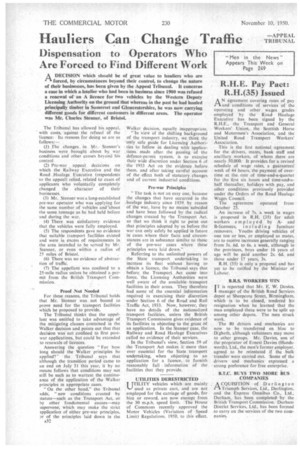Hauliers Can Change Traffic
Page 34

If you've noticed an error in this article please click here to report it so we can fix it.
Dispensation to Operators Who Are Forced to Find Different Work
A DECISION which should be of great value to hauliers who are -r-k forced, by circumstances beyond their control, 6, change the nature of their businesses, has been given by the Appeal Tribunal. It concerns a case in which a haulier who had been in business since 1900 was refused a renewal of an A licence for two vehicles by the Western Deputy Licensing Authority on the ground that whereas in the past he had hauled principally timber in Somerset and Gloucestershire, he was now carrying different goods for different customers in different areas. The operator was Mr. Charles Stenner, of Bristol.
The Tribunal has allowed his, appeal, with costs, against the refusal of the licence: Its reasons for doing so are as follows:—
(1) The changes, in Mr.. Stenner's business were brought about by war conditions and other causes beyond his control.
(2) Pre-war appeal decisions on which the Railway Executive and the Road Haulage Executive. (respondents to the appeall relied, related to cases of applicants who voluntarily completely changed the character of their businesses.
(3) Mr. Stenner was a long-established pre-war operator who was applying for the same number of vehicles aneabout the same tonnage as he had held before and during the war.
(4) There was satisfactory evidence that the vehicles were fully employed.
(5) The respondents gave no evidence that suitable transport facilities existed and were in excess of requirements in the area intended to he served by Mr. Stenner, or even within a radius of 25 miles of Bristol.
(6) There was no evidence of abstraction of traffic.
(7) The appellant was confined to a 25-mile radius unless he obtained a permit from the British Transport Commission.
Proof Not Needed
For these reasons, the Tribunal holds that Mr. Stenner was not bound to prove need for the transport facilities which he proposed to provide.
The Tribunal thinks that the appellant was entitled to take advantage of the mitigating clauses contained in the Walker decision and points out that that decision was not confined to first postwar applications, but could be extended to renewals of licences.
Answering the question "For how long should the Walker principles be applied?' the. Tribunal says that although the transition period came to an end on July 31 this year, it by no means follows that conditions may not still be such as to warrant the continuance of the application of the Walker principles in appropriate cases.
"On the other hand." the Tribunal adds', "new conditions created by statute—such as the Transport Act, or by other fundamental causes—may supervene, which may make the strict application of either pre-war principles, ar of the principles laid down in the
A32
Walker decision, equally inappropriate. "In Vivi, Of the shifting background of the transport industry, we think the "only safe guide for Licensing Authorities to follow in dealing with applica. lions made after the passing of the defence-permit system, is to exercise their wide discretion under Section 6 of
• the '1933 Act on the evidence before them, and after taking careful account of the effect both of statutory, changes and of current industrial conditions.
Pre-war Principles
"The task is not an easy one, because the changes that have occurred in the haulage industry since 1939, by reason of the war, have by no means subsided and have been followed by the radical changes created by she Transport Act, so that we think it right to point out that principles adopted by us before the war can only safely be applied in future in cases where their facts and circumstances are in substance similar to those of the pre-war cases where these principles were laid down."
Referring to the unlimited powers of the State transport undertaking to increase its fleet without having to obtain a licence, the Tribunal says that before the Transport Act came into force, the Licensing Authorities were well aware of the available transport facilities in their areas. They therefore had some 'of the essential information required in exercising their discretion under Section 6 of the Road and Rail Traffic Act, 1933. Now, however, they have no details of the nationalized transport facilities, unless the British Transport Commission gives evidence of its facilities in objecting to the grant M an application, In the Stenner case, the Railway and Road Haulage Executives called no evidence of their services.
In the Tribunal's view, Section 59 of the Transport Act makes it more than ever essential for the State transport undertaking, when objecting to an application for a licence, to furnish reasonably full information of the facilities that they provide.
UTILITIES DERESTRICTED
UTILITY vehicles which are mainly used as private cars, and are not employed for the carriage of goods, for hire or reward, are now exempt from the 30 m.p.h, speed limit. The House of Commons recently approved the Motor Vehicles (Variation of Speed Limit) Regulations, 1950, to this effect.




















































































